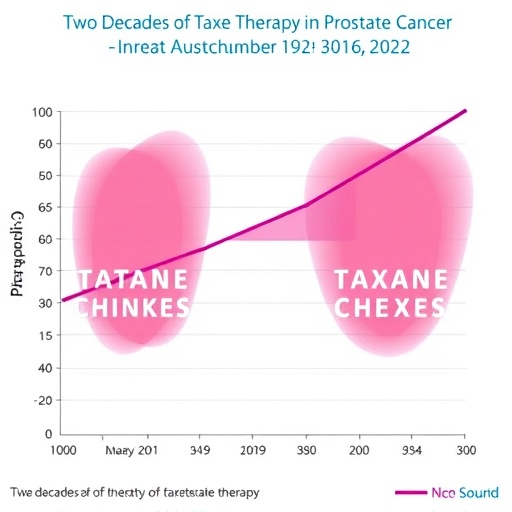In 2024, the medical community celebrated a significant milestone — twenty years since the FDA gave the green light to taxane therapy, specifically docetaxel, for use in advanced prostate cancer. This approval marked a watershed moment in oncology, as it was the first time a treatment that did not target androgen pathways demonstrated a substantial improvement in overall survival rates for prostate cancer patients. The advent of taxane therapy transformed the landscape of prostate cancer management, shifting the paradigm toward more effective and nuanced treatment options.
What was particularly groundbreaking about docetaxel was its mechanism of action. Unlike traditional therapies that focus primarily on hormone levels, taxanes work by disrupting the microtubule network within cancer cells, which is crucial for their division and replication. As a result, they effectively halt the proliferation of cancer cells, leading to increased apoptosis or programmed cell death. The application of taxanes in clinical practice has since evolved, further underscoring their integral role in managing prostate cancer.
Recent studies have provided compelling evidence that taxanes like docetaxel do not just offer benefits in late-stage prostate cancer but are also advantageous when combined with androgen-receptor-targeting therapies in early-stage metastatic hormonally sensitive prostate cancer. This combination has been shown to enhance overall survival rates significantly, leading to a consensus among oncologists that taxane therapy should be a cornerstone of treatment regimens for prostate cancer patients across different stages of the disease.
Moreover, current research indicates that taxane therapy is well-tolerated by many patients, often displaying a manageable side effect profile. This tolerance contributes to the increasing popularity and utilization of taxanes in clinical settings, as healthcare providers feel more confident prescribing them as part of a comprehensive treatment plan for prostate cancer. Understanding patient perspectives and outcomes, particularly in terms of quality of life, adds another layer to the ongoing discussion around the use of taxanes in therapeutic strategies.
However, the introduction of taxanes into the treatment arsenal for prostate cancer is not without challenges. Resistance to these agents is a growing concern, and studies have begun to unravel the complexities of how prostate cancer cells develop resistance to taxane therapy. Some insights point to genetic mutations, alternative signaling pathways, and changes in drug metabolism as potential mechanisms contributing to this resistance. Understanding these pathways is pivotal for the development of next-generation therapies that could either enhance sensitivity to taxanes or circumvent the resistance altogether.
In navigating the future of prostate cancer treatment, the research community is at a critical juncture. Efforts are underway to exploit the mechanisms of taxane resistance to devise innovative treatment strategies. Combinations of taxanes with other modalities or the development of novel agents that target resistance pathways are being explored. A multifaceted approach is crucial, as it allows clinicians to personalize treatment, potentially improving outcomes for patients who have exhausted standard therapeutic options.
The robust body of literature surrounding taxane therapy in prostate cancer continues to evolve. Recent publications emphasize the importance of ongoing clinical trials assessing the effectiveness of new combination regimens involving taxanes. Researchers are keenly interested in understanding how these combinations can provide synergistic effects that not only improve survival but also mitigate adverse effects. The anticipation surrounding these findings is palpable among both oncologists and patients striving for better treatment outcomes.
As advancements unfold, the medical community remains vigilant in monitoring emerging evidence regarding the efficacy of taxanes in various contexts. The paradigm shift initiated by this groundbreaking therapy remains a topic of wide interest, driving ongoing discussions about best practices in oncology. The narrative of taxane therapy is far from over; indeed, it may serve as a critical reference point for the development of future cancer therapies.
In summary, the past two decades have witnessed significant progress in the understanding and application of taxanes in prostate cancer treatment. While challenges such as drug resistance continue to pose hurdles, the potential for new strategies to enhance the effectiveness of taxanes provides exciting prospects for patients and clinicians alike. The legacy of twenty years of taxane therapy not only underscores its impact on survival but also paves the way for innovations that could further transform prostate cancer care for future generations.
As we look to the future, collaborative efforts between researchers, clinicians, and pharmaceutical companies will be essential in refining treatment protocols and tackling the challenges of drug resistance. Together, the triumphs and trials of taxane therapy serve as a reminder of the ongoing quest for improved cancer therapies and the unwavering commitment to enhance patient outcomes.
By fostering a robust dialogue through clinical trials and research publications, the foundation laid by taxane therapy continues to inspire future investigations in the field. The next chapter of cancer therapy is likely to build upon these achievements, aiming for greater precision in treatment that addresses the unique intricacies of each patient’s cancer journey.
Subject of Research: The role of taxanes in the treatment of prostate cancer.
Article Title: 20 years of taxane therapy in prostate cancer — the past, present and future.
Article References:
Carceles-Cordon, M., Rodriguez-Bravo, V., Petrylak, D.P. et al. 20 years of taxane therapy in prostate cancer — the past, present and future.
Nat Rev Urol (2025). https://doi.org/10.1038/s41585-025-01104-9
Image Credits: AI Generated
DOI:
Keywords: Prostate cancer, Taxane therapy, Docetaxel, Drug resistance, Survival rates, Clinical trials.
Tags: advanced prostate cancer treatmentsapoptosis in cancer treatmentcombination therapies for prostate cancerdocetaxel approval historyevolution of prostate cancer managementFDA approval of cancer drugshormone-sensitive metastatic prostate cancermechanisms of action in oncologymicrotubule disruption in cancer therapyoncology treatment breakthroughsprostate cancer survival ratestaxane therapy in prostate cancer





